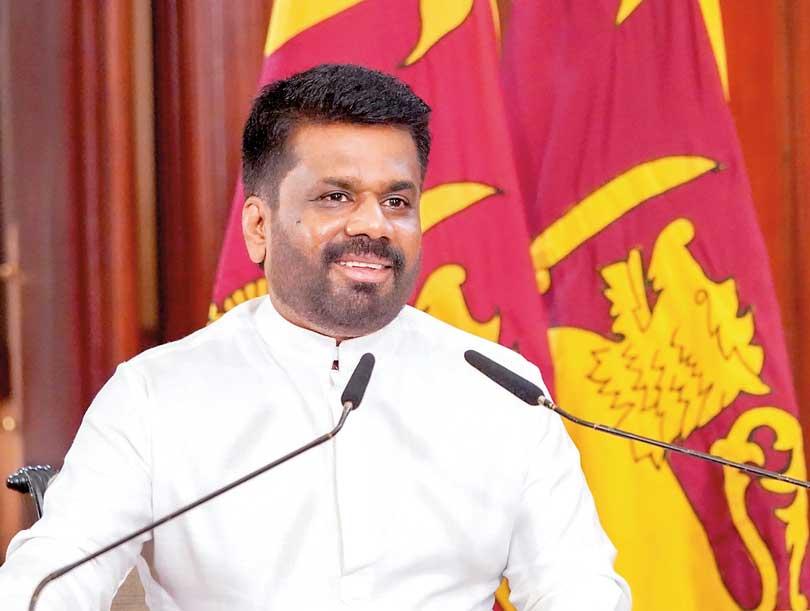Reply To:
Name - Reply Comment

Anura Kumara Dissanayake
By Shabiya Ali Ahlam
President Anura Kumara Dissanayake in his inaugural address to the nation last evening pledged to prioritise economic stability and restore confidence in the country’s recovery.
Dissanayake announced that his government would immediately initiate negotiations with the International Monetary Fund (IMF) to proceed with the activities under the extended credit facility programme. As the island nation continues to recover from the severe economic crisis that triggered widespread hardships, the president emphasised that regaining stability is crucial.
“Additionally, to advance our debt restructuring programme, we are negotiating with the relevant creditors to expedite the process and secure the necessary debt relief. We are confident that we can gain the support of both the people of this country and international community and we believe that through this collective support, we can achieve success,” he said.
Earlier yesterday, Fitch Ratings, in its latest commentary, noted that one of the opposition leaders winning the September 2024 presidential election adds uncertainty to the country’s policy direction.
According to Fitch, the change in leadership could lead to a delay in the completion of the foreign currency debt restructuring and renegotiation of the IMF programme.
The upcoming 2025 budget, to be adopted by November 2024, could offer clarity on the new government’s policies, it said.
The rating agency yesterday affirmed Sri Lanka’s Long-Term Foreign Currency Issuer Default Rating (IDR) at ‘RD’ (Restricted Default) and Long-Term Local Currency IDR at ‘CCC-’.
The Long-Term Foreign Currency IDR has been on ‘RD’ since May 2022, once the grace period expired.
The sovereign remains in default on its foreign currency obligations, while restructuring negotiations are ongoing with Sri Lanka’s private external creditors.
“The authorities’ recent announcement that a preliminary debt restructuring agreement has been reached, in principle, with the members of the steering committee of the Ad Hoc Group of Bondholders (representing foreign holders of Sri Lanka’s international sovereign bonds) and China Development Bank (A+/Negative) suggests progress is being made,” the rating agency said in its latest commentary.
The agreement comes after the April 12, 2022 announcement suspending debt servicing on several categories of external debt, including bonds issued in international capital markets, foreign currency-denominated loans and credit facilities with commercial banks and institutional lenders.
Sri Lanka completed the local currency portion of its domestic debt optimisation in September 2023. This followed the exchange of the Central Bank of Sri Lanka’s Treasury bills and provisional advance into new Treasury bonds and bills.
“This led us to upgrade the Local Currency IDR to ‘CCC-’. The rating is being affirmed at this level,” Fitch said.
Earlier this week, global rating agency Moody’s said it does not expect any significant shifts in Sri Lanka’s reform trajectory or policies, although some reprioritisation is likely.
“Crucially, former president Ranil Wickremesinghe had pushed through an economic transformation act in Parliament in May. The act – in the absence of a new act or changes approved by Parliament – will oblige future governments to the current set of economic and fiscal reforms, including adhering to fiscal and debt targets set under the IMF programme,” it said.
Moody’s acknowledged that the act also requires any government to present to Parliament the steps and measures being taken to achieve specific targets stipulated in the act by March 31 each year, to maintain the reform momentum.
The commentary highlighted that the new president has not opposed Sri Lanka’s debt restructuring deals and has said any changes to policy and reform measures would be in consultation with the IMF. However, he has opposed the privatisation of state-owned enterprises in important sectors.
“As any negotiation of potentially revised targets or changes in specific measures will take time, there could be delays in disbursements or finalisation of external debt restructuring with private sector creditors,” the agency said.
It went on to note that the possibility of early parliamentary elections could also add to the delay.
“We expect some period of political uncertainty until a new Parliament is formed,” Moody’s said.
Meanwhile, IMF Managing Director Kristalina Georgieva, in a letter to President Dissanayake congratulating his win, gave assurance that the IMF remains a steadfast partner and stands ready to assist Sri Lanka to achieve its development and reform goals, including under the ongoing IMF-supported programme.
She stated that the IMF looks forward to working together with the new Sri Lankan president and his team towards building on “the hard-won gains that have helped put Sri Lanka on a path to recovery” since entering one of its worst economic crises.